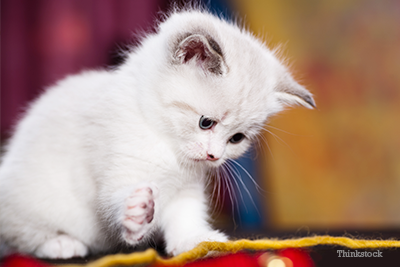
So you took the big step, you brought a new kitten into your home. Now, the first thing you can do is unplug the television because this kitten will be your new and constant source of entertainment. If, by some chance, you have 2 new kittens, you can also put your books away and be prepared for many memorable hours.
Sharing your home with a kitten or 2 is one of the most enjoyable experiences you’ll ever have. Unfortunately, it doesn’t last forever and it’s important to do everything you can to make that adorable lint ball a healthy, well adjusted cat that will share your life for years to come.
Preventing common kitten diseases and parasites
The first thing you need to do is have your kitten examined by your veterinarian to be sure there are no health concerns that need to be addressed right away. Many kittens come with hitchhikers like parasites and fleas or even infectious diseases. Your veterinarian is the best person to evaluate your kitten's health.
Assuming your kitten is healthy, it is also important that she be immunized against a variety of infectious diseases. Your veterinarian will recommend appropriate vaccinations and set up a schedule for you.
Feeding your kitten
Feeding your kitten may not seem like rocket science, but it does take a little self control and there is more to it than you might expect. Our understanding of cat nutrition has come a long way and there are many foods available to meet the growth and energy needs of kittens. Ask your veterinarian to recommend a food. Most experts recommend feeding small meals and making feeding part of the kitten’s daily stimulation and activity. Free choice feeding may be simple but some cats may become overweight.
Keeping your kitten sheltered
The very first decision to make about your cat is where she will live. Cats are undoubtedly safer and healthier if kept totally indoors or in a screened area that connects indoors and outdoors. I often hear protests that the more “natural” place for cats is outdoors. While this was once true, we need to take into account that the evolutionary ancestors of cats were not subjected to urban life. Outdoor cats are exposed to the dangers of automobiles, attacking dogs and even other cats. The list of outside dangers goes on and on.
Indoor cats need to be provided with a clean, fresh litter box that will entice them to use it as their toilet. Introduce your kitten to the litter box early and often. It is instinctive for kittens to cover their urine and stools but it is up to you to keep the pan clean and odor free.
Stimulating and interacting with your kitten
Stimulation and interaction are critical in the socialization and natural enjoyment of your new kitten. Provide gentle interaction and avoid rough play like hand fighting that can lead to displaced aggression. Cats are, by nature, gentle and placid. Help keep them that way. Make every effort to respect the normal, instinctive behavior of wild cats. Cats like to be alone at times so provide places for your kitten to hide and find peace. It can be as simple as a paper bag or a cardboard box.
Cats like to be up high so provide places your kitten can climb, jump and post watch over what is below. Climbing trees are easily constructed from scraps of lumber and carpet or you can buy elaborate climbing/playing environments from specialty stores or online.
Cats come, factory equipped, with their own shredders in the form of claws that they use to defend themselves, mark territory, climb and exercise. Introduce your kitten to a scratching post made of carpet or cardboard. With a little effort this will become your kitten’s scratching area of choice. Without a preferred place of their own, kittens will resort to furniture and drapes. A few hours invested in training your kitten will help you avoid a lot of damage and frustration.
Spaying and neutering your kitten
Your kitten was fortunate enough to find a good home with you. Unfortunately, many kittens are not so lucky. There is a huge surplus of kittens and many never know a home. At this time, surgical sterilization is the only sure way of preventing unwanted litters. All pet kittens should be spayed and neutered for behavioral, population and health reasons.
Ask the expert
Always look to your veterinarian as the best source of information about your kitten. Medical and behavioral problems should be addressed as soon as possible before they become permanent.
So now, have fun and enjoy your kitten!
If you have any questions or concerns, you should always visit or call your veterinarian -- they are your best resource to ensure the health and well-being of your pets.
